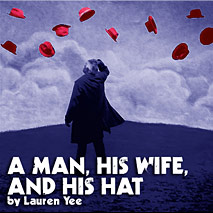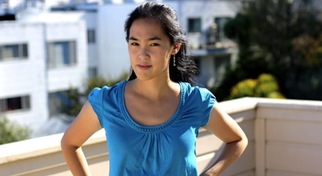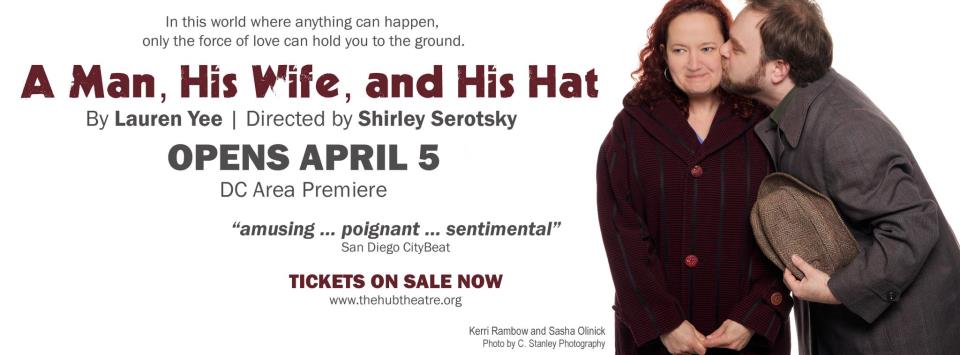 Jacqueline Lawton: Why did you decide to get into theatre? Was there someone or a particular show that inspired you? LAUREN YEE: When I was six, I distinctly remember telling my father that I wanted to be a starving artist. Nowadays, that hopefully won't be the case, but basically I always wanted to be a writer. It was in high school, however, that I zeroed in on playwriting as the right medium for me. I'm someone who loves dialogue. My strength as a writer comes from my ear for hearing language and how people speak. Playwriting allowed me to take advantage of that, and gave me the chance to write for people and with a sense of immediacy. Plays become tangible when there are other actors in the room; this made the whole process of writing seem so much less lonely and more urgent. JL: Next, tell me a little bit about your writing process. Do you have any writing rituals? Do you write in the same place or in different places? LY: My writing can be messy, haphazard, and sprawling. It makes sense to me then that I very much like to control my writing habits and environment. I like certainty and sameness and good conditions when I write in a slightly OCD kind of way; I am one of those people who can't write if the height of the table is too high or the temperature is off. I also like trapping myself in a coffee shop. If I've paid two bucks for a tea, I will probably not stop working until I get my two dollars' worth of writing time in. Also, coffee shops give me that white noise in the background that helps me concentrate (whereas I know some people can't stand it). It's helpful for me to imagine my writing self as a small, unpredictable, sometimes unreasonable pet that I'm responsible for and need to cater to. For instance, some days my writing self wants to sit for six hours straight working. And some days it just needs a burrito. And I just try not to get in the way of it. JL: Describe for me all the sensations you had the first time you had one of your plays produced and you sat in the audience while it was performed...what was different about the characters you created? How much input did you have in the directing of that work? LY: In the very beginning, I had a 10-minute piece that was being performed about an hour outside of where I lived at the time. I basically came for opening night, watched my piece, and just kind of held my breath the entire time. )I get anxious about where people will laugh, if they're listening.) Since then, the process has roughly been the same. Many of my productions have been out of town, and I am rarely around for the entire rehearsal process. Typically, I may be around for the beginning of rehearsals and then return for final dress and tech, so I'm coming back to a piece as it's close to being completely open and running. Honestly, I enjoy being surprised at what comes out. In graduate school, I was able to be heavily involved in the design and rehearsal process for my work, but obviously that's a luxury that you don't always get to have. If your work has a life beyond the initial production, most likely you will have to let go of a fair amount. As far as playwrights go, I think I'm fairly good at giving the director and actors room to explore, namely because I personally would be a horrible director and really wouldn't have better ideas about how they "should" be approaching the play. For that reason (among others), I have immense respect for what directors do and how much of themselves they put into the process. JL: What do you hope to convey in the plays that you create--what are they about? What sorts of people, situation, circumstances, do you like to write about? LY: I love comedy from a sideways, unexpected angle. I believe that pain and humor go hand in hand, and that a play should run the gamut of emotions. I want a play that makes me laugh, makes me feel, teaches me something new, makes me view the world in a new light. I like plays with a lot of stuff in them. I also tend to write a lot of brother-sister relationships. I have two younger brothers, and that kind of dynamic has weaseled its way into my writing. My much younger self would probably be annoyed at this. Pregnant women and babies also magically show up in a lot of my plays. Not because I've had a kid yet and not because being pregnant is the only state that makes a female character interesting, but because the whole process of making a new human being and the choices and tradeoffs involved have always seemed to reveal exciting, desperate things, horrifying and/or rewarding things about who we are as human beings. JL: Tell us about A MAN, HIS WIFE AND HIS HAT and what inspired you to write it. LY: Three years ago, I went to a writers residency along Egypt's Red Sea. They housed the writers at a German-owned golf resort. (I woke up to rich Europeans and Egyptians teeing off outside my window.) Everyone there had an accent (me included) and the only two channels I could get in English were the History Channel (which played WWII documentaries) and the international (read: less good) version of CNN. I was interested in the idea of narration and storytelling, and I'd always thought the title of Oliver Sacks's neurology book THE MAN WHO MISTOOK HIS WIFE FOR A HAT would always been a good jumping off point for a play. (An earlier temporary title for this play was THE MAN WHO MISTOOK HIS WIFE FOR GRANTED.) It was in this environment that I came up with the play. JL: The HUB Theatre did a reading of A MAN, HIS WIFE AND HIS HAT last year. What did you learn from that experience? Has the play grown or changed since then? LY: Once again, I wasn't able to get down to the D.C. area when the Hub did the reading of my play, but I heard it went well! And it was really exciting to hear that they wanted to do a production of the play, because I actually hadn't met anyone from the Hub Theatre yet and it's so rare that a theater chooses to produce a play without knowing the playwright at all. I've done some small tweaks on the play since then. JL: What do you hope audiences are thinking about after experiencing A MAN, HIS WIFE AND HIS HAT? LY: To me, this play is about the idiosyncrasies of relationships, particularly long-standing ones. My grandparents were married for over sixty years, and I remember feeling that for them, love had morphed somewhere along the way. It wasn't all about romantic gesture. Making the bed together or correctly parking the car was just as important. I find relationships as they age simultaneously disconcerting, hilarious, and beautiful. I also hope that this play expands the form a little bit and challenges people to think in big, bold ways about what can be put on stage. I like to give audiences something that hasn't been done before with the form (or at least something that hasn't been done too often). JL: What advice do you have for up-and-coming playwrights? LY: Find your tribe. Be nice, or at least be the kind of person that other people might not mind spending time in a room with. Caffeinate. Be okay with the fact that most of what you write will not be good, will be discarded, will probably never been read or heard or seen by anyone but you. Know which theaters fit you as a playwright. Be rigorous in applying for things. Experience storytelling in different forms (books, podcasts, graphic novels, etc). JL: What’s next for you as a playwright? Where can we follow your work? LY: I'm on Facebook (so come find me!), and like everyone else, I figured out how to get a website up and running (www.laurenyee.com). I'm currently living in New York and I'm a member of Women's Project Lab and the Ma-Yi Writers' Lab, so I occasionally pop up with stuff there. I just had a run of shows this spring, so the next concrete productions I have lined up are a group show with the Women's Project Lab (spring 2014) and show with Encore Theatre Company in San Francisco (winter 2015). Also currently working on a new commission for Lincoln Center Theatre/LCT3, so plenty busy!  LAUREN YEE was born and raised in San Francisco, and received her bachelor’s degree from Yale University. Her full-length play CHING CHONG CHINAMANwas a finalist for the 2008 Princess Grace Award and the winner of the Kennedy Center American College Theater Festival’s 2010 Paula Vogel Award, and Kumu Kahua Theatre’s 2007 Pacific Rim Prize, and was named one of the top 10 plays of the year by the East Bay Express and City Pages. A MAN, HIS WIFE, AND HIS HAT was developed at PlayPenn and UCSD’s Baldwin New Play Festival, produced at AlterTheater, and received its San Diego premiere at Moxie Theatre in the spring. The Bay Area Playwrights Festival, AlterTheater, the O’Neill Studio at Yale, and PlayGround have previously commissioned her work. She is currently working on new commissions for the Kennedy Center and Mu Performing Arts (with support from the MAP Fund).  The Hub Theatre is an award winning, professional non-profit theatre making its home in Fairfax County, Virginia. The Hub Theatre is a member Theatre Washington. The Hub has received grants from Target, the Fink Foundation, the Arts Council of Fairfax, The Friends of Lake Anne, Virginia Commission for the Arts, the Arts Council of Fairfax, Integrity Applications, and Booz Allen Hamilton. Mission The Hub Theatre endeavors to produce work that highlights our common humanity, providing a theatrical experience that is at once challenging and inclusive. We strive to be the physical center of a dynamic circle of story, art, and community, to create the transcendent exchange unique to live theatre.
0 Comments
Your comment will be posted after it is approved.
Leave a Reply. |
My BlogI'm a playwright, dramaturg, and teaching artist. It is here where you'll find my queries and musings on life, theater and the world. My posts advocate for diversity, inclusion, and equity in the American Theatre and updates on my own work. Please enjoy!
Categories
All
Archives
June 2020
Reading List
|

